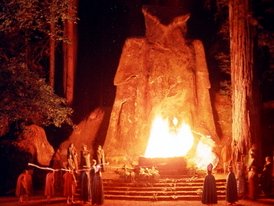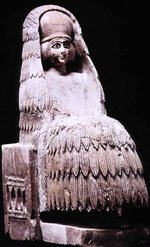Pagan Practices and the Holiness Code
Pagan practices involving same sex activity abounded in the fertility goddess religions of ancient Canaan. It is impossible to understand Leviticus 18:22 and 20:13 without first understanding Leviticus 17:7, 18:3 and 21 and 20:2, 3, 4, 5, 23. Context is vitally important if we want to correctly interpret the Bible in the twenty first century.
Molech, a pagan fire god.
God prohibited the worship of these false gods because such worship was abomination to God. Here are two verses non-gay Christians love to use against gay people, especially gay Christians.
"Thou shalt not lie with mankind, as with womankind: it is abomination." Leviticus 18:22.
"If a man also lie with mankind, as he lieth with a woman, both of them have committed abomination: they shall surely be put to death; their blood shall be upon them." Leviticus 20:13.
God carefully placed the prohibitions of Leviticus 18:22 and 20:13 in the context of Molech worship, 18:3 & 21 and 20:2-5 & 23 so we would know what kind of abomination He was talking about. Is it honest to ignore the obvious link to Molech when we study these verses? God put them in the context of Molech so we would understand that these verses are talking about worshiping false gods, not gays and not lesbians.
 |
Molech Idol
In A Grove
The Holiness Code prohibited sexual worship of the fertility goddess. That is why God placed the prohibitions of Lev 18:22 & 20:13 in the context of the worship of false gods like goat idols, Lev 17:7 and Molech and Ashtoreth.
The context is pagan religious worship of a false goddess, not homosexuality. Scripture addresses fertility cult worship under the rubric of Molech worship. When God mentions the ancient fire god Molech, also called Moloch in scripture, it is a given that Molech worship includes the pagan practices of his fertility goddess consort, Ashtoreth, 1 Kings 11:5-7 & 33; 2 Kings 23:13. Molech, Moloch and Milcom are different names for the same false god.
Fertility cults in ancient Canaan used same sex activity in worship rituals for many centuries before Israel entered the land.
 |
Ashtoreth, the fertility goddess consort of Molech.
This is an ancient Ashtoreth idol. Worship of Ashtoreth involved anal sex between priests of the goddess and worshipers. This is the same sex practice God and Moses intended to prohibit.
That same sex religious activity is what God prohibited Israelite men to practice in Lev 18:22 and 20:13. The NET Bible links Molech worship with sexual sin and spiritual prostitution.
The context of Leviticus 18:22 and 20:13 is not gay men or lesbians or gay sex. Homosexuality was not the issue for Moses or God when Leviticus was written. Instead, the context of Leviticus 18:22 and 20:13 is the spiritual and physical prostitution that accompanied worship of Molech and Ashtoreth.
The NET Bible lists possible meanings of the men with men
prohibition in Leviticus 18:22.
“It could refer to either human sacrifice or a devotion of children to some sort of service of Molech, perhaps of a sexual sort (cf. Lev 20:2-5; 2 Kgs 23:10, etc.).
The inclusion of a prohibition against Molech worship here may be due to some sexual connection of this kind.”
The following quotation from the NET Bible Translation indicates that the context is pagan practices involving prostitution in service to Molech and by extension, Ashtoreth, Molech's fertility goddess consort, 1 Kings 11:5-7 & 33; 2 Kings 23:10.
The NET Bible on Leviticus 20:2-5.
“Any man from the Israelites or from the foreigners who reside in Israel who gives any of his children to Molech must be put to death...
I myself will set my face against that man and cut him off from the midst of his people, because he has given some of his children to Molech and thereby defiled my sanctuary and profaned my holy name.
If, however, the people of the land shut their eyes to that man when he gives some of his children to Molech so that they do not put him to death,
I myself will set my face against that man and his clan. I will cut off from the midst of their people both him and all who follow after him in spiritual prostitution, to commit prostitution by worshiping Molech.”
What was God's purpose in prohibiting Egyptian and Canaanite
fertility goddess worship?
Why would God command the children of Israel not to adopt the abominable pagan practices, the sexual, religious practices of Egypt and Canaan? One reason may be the cult of Isis and Osiris.
In the beginning of time, ancient Egyptians believed Osiris ruled Egypt as King, with his sister Isis, as Queen. These brother and sister royals had an incestuous sexual relationship and eventually produced a son named Horus.
Egypt is infamous in scripture, for her pagan practices and sexual sins: Leviticus 18:3 & 21 and 20:2-5 & 23; Ezekiel 16:26, 23:3, 20-21.
 |
Rabbi Jacob Milgrom,
Hebrew Scholar and author.
According to Dr. Jacob Milgrom, in his 3000 page Anchor Bible Commentary on Leviticus, (Milgrom, Leviticus 17-22, pp. 1518-1519, 1539), incestuous sexual relationships involving father and daughter, brother and sister, nephew and aunt, uncle and niece were common in Egyptian society, even among non-royals.
Moses, Aaron and Miriam were
born into an incestuous
nephew-aunt relationship
which originated in Egypt.
“And the name of Amram’s wife was Jochebed, the daughter of Levi, whom her mother bare to Levi in Egypt: and she bare unto Amram Aaron and Moses, and Miriam their sister.” Numbers 26:59.
“And Amram took him Jochebed his father’s sister [his aunt] to wife; and she bare him Aaron and Moses.” Exodus 6:20.
Marriages between close family members were not prohibited for God’s people until after Israel left Egypt, around 1450 BC. When God gives Moses the Holiness Code, before Israel enters the land of Canaan, He carefully prohibits pagan practices, cultic practices, sexual practices which might encourage Israel to serve the fertility goddess.
Because God placed the prohibitions of Leviticus 18:22 and 20:13 in the context of pagan religious practices, we conclude that the Holiness Code is dealing with pagan religious practices, not gays and not lesbians and not homosexuality.
Homosexuality in the twenty first century is not part of ancient Canaanite fertility goddess worship.
Molech Temple
and Idol figure.
Molech idols in ancient Canaan were large metal figures. The picture depicts how the Molech statue might have looked at the entrance to Molech's temple. Offering a child sacrifice to Molech involved burning the child in a fire kindled in the belly cavity of the idol.
In the Bible, God prohibited worship of Molech and Ashtoreth, his fertility goddess consort, under the rubric of "Molech worship." If homosexual activity today involved fertility goddess worship, one could use Leviticus 18:22 and 20:13, to make a case that those pagan sexual activities are wrong in that context.
But, a loving faithful committed non-cultic relationship between two women or two men or a gay marriage, has no correlation to the pagan practices and same sex activities intended, in ancient times, to placate and worship the fertility goddess.
Scripture cannot mean NOW
What it did not mean THEN.
Because God and Moses were referring to the pagan practices and same sex activities of worshipers of the Canaanite fertility goddess, and not faithful committed non-cultic relationships or gay marriage between two women or two men, that truth influences how we interpret this passage.
If scripture was not referring to faithful committed non-cultic homosexual relationships then, scripture is not referring to all faithful, committed homosexual relationships now. In plainer words, the prohibitions of Leviticus are not aimed at gays and lesbians today.
Leviticus 18:22 and 20:13 were aimed at preventing pagan practices related to the abomination of fertility goddess worship. Ripping these verses out of their context of Molech worship and cult or shrine or temple prostitution and then insisting the out of context verses are really talking about gays and lesbians is spiritual malpractice. Honest Christians don't mishandle the Bible that way. Outlawing loving faithful committed non-cultic gay relationships was not the purpose Moses or God had in mind when Leviticus was written.
Pagan Practices Of Fertility Cults
- That's What The Bible Prohibits.
God and Moses intended to prevent Israel from adopting the pagan practices and illicit sexual worship of the Canaanite fertility cults. That was the problem Israel faced back then and that is the underlying reason for Leviticus 18:22 and 20:13.
Click Here to return to the Starting Page for Leviticus.
eBook Gay Christian 101: Spiritual Self-Defense For Gay Christians, by Rick Brentlinger.
From Pagan Practices, return to Gay Christian 101 Home Page.
Google Translate
into 90 languages
We are saved:
by grace alone through faith alone
Recent Articles
-
Gay Christian 101 - Affirming God's glorious good news for all LGBs.
Jan 08, 24 12:57 AM
Gay Lesbian Bisexual Christian 101 - Accurate biblical and historical info defending LGB Christians from the anti-gay crowd. -
Romans 1 describes ancient shrine prostitution, not gays and lesbians.
Dec 21, 23 04:37 PM
Romans 1, in historical context, is about ancient Roman fertility goddess worshipers who engaged in shrine prostitution to worship Cybele, not gays and lesbians. -
The Centurion And Pais - When Jesus Blessed A Gay Couple.
Nov 14, 23 10:32 PM
Centurion and Pais? If Jesus blessed a gay relationship, would this change your view of homosexuality?
Bible Study Resources
for eDisciples



